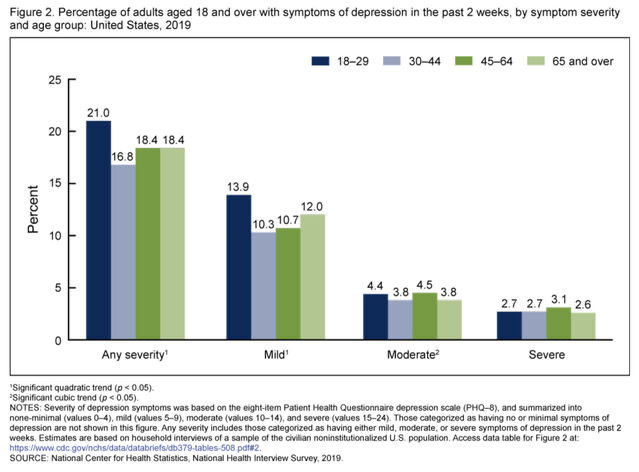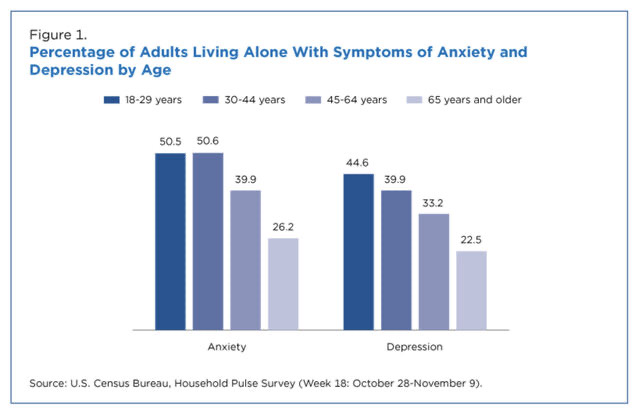Resolving challenges during a pandemic is difficult for emerging adults.
KEY POINTS
- Compared to other age groups, emerging adults report the highest levels of depression.
- A majority of emerging adults (71%) indicate increased stress and anxiety due to the COVID-19 outbreak.
- Identity, instability, self-focused, feeling in-between, contribute to higher amounts of depression and anxiety in emerging adults.
- Job loss, living back home with parents or living alone, and trying to date all contribute to emerging adults' depression.
If you are reading this and you are between the ages of 18-29, you are what psychologists call an emerging adult. Five major struggles occur during emerging adulthood: identity, instability, being self-focused, feeling in-between, and new possibilities.
These struggles are challenges in and of themselves during normal times, but trying to resolve them during a pandemic makes it even a greater challenge, and I suspect they are contributing to higher amounts of depression and anxiety in emerging adults in 2021.
Increased Depression in Emerging Adults
Which age group ranks number one in depression in the United States? Answer: emerging adults ages 18-29, according to the National Center for Health Statistics:
"The percentage of adults who experienced any symptoms of depression was highest among those aged 18-29 (21.0%), followed by those aged 45-64 (18.4%) and 65 and over (18.4%), and lastly, by those aged 30–44 (16.8%)." (NCHS Data Brief No. 379, p. 1.)
Identity confusion, instability, and feeling in-between like a child but expected to act and perform like an adult no doubt contribute to the increased levels of depression.

Source: Villarroel & Terlizzi/National Center for Health Statistics/Public Domain
The COVID-19 Pandemic and Emerging Adults
Add the COVID-19 pandemic into the mix for emerging adults and what do you get? Levels of stress and anxiety flying off the charts. Son et al. (2020) assessed the general stress level of 195 Texas college students using the perceived Stress Scale-10 in the month of April 2020 during the first stay-at-home order in Texas. They found:
"Of the 195 students, 138 (71%) indicated increased stress and anxiety due to the COVID-19 outbreak."
"Multiple stressors were identified that contributed to the increased levels of stress, anxiety, and depressive thoughts among students." These include:
- Fear and worry about their own health and of their loved ones (91%)
- The difficulty of concentrating (89%)
- Disruptions to sleeping patterns (86%)
- Decreased social interactions due to physical distancing (86%)
- Increased concerns about academic performance (82%)

Source: Máximo/Pexels/License CO0
Emerging Adults Are at a High Risk of Job Loss
According to the Pew Research Center, younger workers are at the highest risk for job loss and unemployment. That is because nearly half are employed in the service sector and these industries are facing a high likelihood of closure during the COVID-19 pandemic.
Work and employment are major factors in one's identity, especially for an emerging adult who is struggling with identity issues, to begin with. To be "let go" for any reason shakes you up down to your very core. They begin to question who they are, where they are headed, and if they even have any new possibilities.
Living Back Home With Parents Is Stressful
Not since the great depression have so many emerging adults been living back home with their parents. A recent Pew Research Center report found 52% of 18-29-year-olds are living with their parents as a result of the COVID-19 pandemic. Many emerging adults have no choice but to move back home with their parents after losing their job as a result of the pandemic.
Group living is always stressful especially when both parties, parents, and child are navigating new roles and rules for living together. Living back home with parents exacerbates the feelings of being "in-between" that emerging adults already have; feeling like a kid, but expected to be acting like an adult. And it is so easy to fall right back into old existing roles many of which are outdated.
THE BASICS
Emerging Adults Living Alone Report More Depression and Anxiety
Most of the emerging adults not living with their parents are living alone. According to the U.S. Census Bureau, emerging adults living alone in 2021 reported greater symptoms of anxiety and depression during the pandemic compared to other age groups.
The 18-29-year-old group reported the highest levels of depression (44.6%) and the second-highest levels of anxiety (50.5%) virtually tied with the 30-44 year-old-group (50.6%). It is clear that humans are social beings and that human interaction is vital to one's mental health.

Source: File & Marlay/U.S. Census Bureau/Public Domain
Living Together and Dating During a Pandemic
One of the new possibilities of single emerging adulthood is to find a meaningful relationship. Emerging adults are waiting longer and longer to get married (one traditional marker of adulthood). According to the U.S. Census Bureau, the average age of first marriage today is 30.5 for men and 28.1 for women. That compares to 22.8 for men and 20.3 for women in 1950.
Even if emerging adults are waiting longer to marry, a higher percentage are living together before marriage. Love and companionship are the top reasons emerging adults give for marriage and cohabitation. "Young adults are particularly accepting of cohabitation — 78% of those ages 18 to 29 say it’s acceptable for an unmarried couple to live together, even if they don’t plan to get married..." (Pew Research Center).
It seems that it has always been a challenge to find a life partner and today is no exception, especially during a pandemic. So, how do single emerging adults find one? The answer for most is online dating. According to the Pew Research Center, 48% of 18- to 29-year-olds say have used a dating site or app.
While the majority of the users of dating platforms overall say they had a positive experience, 45% said that these dating sights or apps made them feel frustrated, 35% pessimistic, and 25% were left feeling insecure.
See also: "The Big Challenge: Jumping From Adolescence Into Adulthood."
Practice Aloha. Do all things with Love, Grace, and Gratitude.
© 2022 David J. Bredehoft
References
Villarroel, M. A.., &Terlizzi, E. P. (2020). Symptoms of depression among adults: United States, 2019. NCHS Data Brief, no 379. Hyattsville, MD: National Center for Health Statistics.
Son, C., Et al. (2020). Effects of COVID-19 on college students mental health in the US: An interview-survey study. Journal of Medical Internet Research. 22(9):e21279. DOI: 10.2196/21279
Fry, R., Passel, J. S., & Cohn, D'Vera. (2020, Sept 4). A majority of young adults in the U.S. live with their parents for the first time since the great depression. Pew Research Center. Retrieved from: https://www.pewresearch.org/fact-tank/2020/09/04/a-majority-of-young-adults-in-the-u-s-live-with-their-parents-for-the-first-time-since-the-great-depression/
Kochhar, R., & Barroso, A. (2020, March 27). Young workers likely to be hard hit as COVID-19 strikes a blow to restaurants and other service sector jobs. Pew Research Center. Retrieved from: https://www.pewresearch.org/fact-tank/2020/03/27/young-workers-likely-to-be-hard-hit-as-covid-19-strikes-a-blow-to-restaurants-and-other-service-sector-jobs/
File, T., & Marlay, M. (2021, January 13). Living alone has more impact on mental health of young adults than older adults. U.S. Census Bureau. Retrieved from: https://www.census.gov/library/stories/2021/01/young-adults-living-alone-report-anxiety-depression-during-pandemic.html
Vogels, E. A. (2020, Feb. 6). 10 facts about Americans and online dating. Pew Research Center. Retrieved from: https://www.pewresearch.org/fact-tank/2020/02/06/10-facts-about-americans-and-online-dating/


